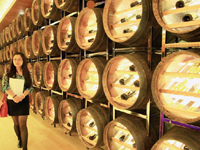"So, when I told him I thought I was drinking too much, he looked at me kind of confused and said: 'What's the problem here?'"
Dr George Hu, a clinical psychologist at Beijing United Family Hospital, says society has come a long way in understanding alcohol abuse, but it still has a very strong stigma.
 |
 |
"It is ingrained in the culture. So not many people are willing to admit they have a problem."
Life stresses, such as moving to another country, often give rise to anxiety, depression, excessive worry and other issues, Hu says. Alcohol is often used as an escape.
The findings of a 2012 study, published in the International Journal of Mental Health, suggest expatriates working abroad may be more prone to mental health problems and substance abuse than their domestic counterparts. Dr Sean Truman and Dr David Sharar surveyed 950 US expatriates working in Latin America, Asia and Europe. They compared their survey results with those of 1,450 US workers who stayed in their homeland and found some telling trends.
The study found that more expats fell into the high and moderate categories for substance-abuse problems.
"There tends to be higher use of substances in the expat community because of environmental stress and the fact that most of these people do not have their family with them and factors that would generally govern substance use," Truman says.
Sharar says: "Many who need help do not seek professional help, as expats tend to be a very resilient group and do not readily believe that professional assistance will make a difference."
When Jim moved to Beijing for work in 1992, he was completely dependent on alcohol but unwilling to admit he was an alcoholic.
A few more years of blurry nights and morning migraines ensued. All the while, Jim felt like "an empty eggshell of a human being, devoid of any sense of meaning".
Alcohol had seeped into every aspect of his life.
"I believed drinking was a very important part of my job," he says. "I used to write off business expenses as 'drinking with customers'."
Drinking had become necessary not only to fuel his addiction but also to keep his business afloat. Saving face and forging friendships often relied on knocking back beers and baijiu shots with clients.
"Drinking is socially sanctioned and very often viewed as necessary when conducting business," Hu says. "There is a lot of stigma attached to being an alcoholic but especially in China."
Hu says there's not so much a lack of resources for alcohol abusers in China as there is a lack of recognition of the disease. Not many are willing to risk careers and reputations by admitting their problems.
"They may know in their heart they need help and know in their heart they are addicted to alcohol, but a lot more is on the line if they give it up," he says.
Near the end of Jim's "hundred days of rock bottom", he would stare into that bathroom light and see his body deteriorating.
But he began to understand the problem was deeper than depression or drinking.
"Alcohol was my god," he says.
"I needed to give my life over to a higher power. I had made a big mess of my life, so I knew my power was useless."
So, Jim made a call to the Beijing Fellows AA group that he believes saved his life.
Then he went to a meeting, not knowing at the time that he had taken the first step toward escaping rock bottom.
"I listened to all these people tell stories that made perfect sense to me," he says.
Afterward, Jim shared his own stories with the first group of people who could relate to them.
He explained how he would binge drink with coworkers, then run off to the rest room to vomit and empty his stomach, just to be certain nobody could drink more than him.
And he told members about the time he was riding his motorcycle in Hong Kong when he came up to a police checkpoint. He was so drunk that he fell off his bike and couldn't even get his license out of his pocket. The police officer helped him back onto his bike and told him in a "fatherly voice" to be careful.
Now 16 years sober, Jim recalls his drunken escapades with a laugh.
He swaps stories with other AA members every week over breakfast in a Sanlitun cafe, sandwiched between a wine shop and a bar, where coffee is now his drink of choice.
"We laugh a little bit at each other's tragedies," he says. "I don't know why. But we do."
He credits AA for saving his life and helping him put alcohol 12 steps and a decade and a half behind him.
Jim says he "loves life and wishes he could live forever".
"If I had continued to drink, I would have died. Or, even worse, I would still be alive and living like a zombie," he says.
"It is no longer a struggle to stay sober because all I have ever (had) after is peace and contentment in my head. I have found it."
Contact the writer at sundayed@chinadaily.com.cn
Kurt Nagl contributed to this story.
|
|
|
|
|
|
|
|
